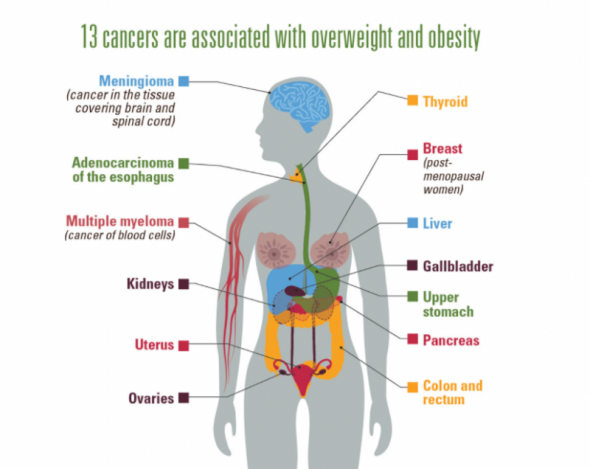[ad_1]

The Centers for Disease Control and Prevention warned Tuesday that overweight and obesity have been linked to increased risk of 13 different types of cancers, which account for some 40 percent of cancer diagnoses nationwide.
In a release from the public health agency highlighting its latest Vital Signs report, officials said many people aren’t aware of the link between excess weight and these cancers.
The International Agency for Research on Cancer has identified them as: meningioma, multiple myeloma, adenocarcinoma of the esophagus, and cancers of the thyroid, postmenopausal breast, gallbladder, stomach, liver, pancreas, kidney, ovaries, uterus, colon and rectum (colorectal).
“A majority of American adults weigh more than recommended — and overweight or obese puts people at higher risk for a number of cancers — so these findings are a cause for concern,” CDC Director Brenda Fitzgerald said. “By getting to and keeping a healthy weight, we all can play a role in cancer prevention.”

According to the CDC, about 630,000 people in the U.S. were diagnosed with a cancer associated with overweight and obesity in 2014. Some 2 in 3 of these cancer cases occurred in adults 50 to 74 years old. While the rates of obesity-related cancers, not including colorectal cancer, increased by 7 percent between 2005 and 2014, the agency said, the rates of nonobesity-related cancers declined during that time.
For the report, researchers from the CDC and National Cancer Institute analyzed 2014 cancer incidence data from the United States Cancer Statistics report and reviewed data from 2005 to 2014 to determine trends for cancers associated with overweight and obesity.
They found, among other things, that 55 percent of all cancers diagnosed in women and 24 percent of those diagnosed in men are associated with overweight and obesity. Black and white Americans showed higher incidence rates for these cancers when compared to other racial and ethnic groups. Black and Native American males, however, were shown to have a higher incidence rate than white males. Cancers associated with overweight and obesity, excluding colorectal cancer, also showed an increase among adults younger than age 75.
“As an oncologist, when people ask me if there’s a cure for cancer, I say, ‘Yes, good health is the best prescription for preventing chronic diseases, including cancer,'” Lisa C. Richardson, director of CDC’s Division of Cancer Prevention and Control, said. “What that means to healthcare providers like me is helping people to have the information they need to make healthy choices where they live, work, learn, and play.”
Theodore Brasky, a professor and researcher at the Ohio State University, who is not affiliated with the study, told The Guardian that America has a “massive” obesity problem that must be tackled with prevention.
“It’s interesting when we talk about cancer in this country, we talk about beating cancer and the cancer moonshot initiative, but all of these things are focused on treating cancer, curing cancer,” said Brasky. “What we need to talk about is preventing cancer, eating better.”
He added: “Those approaches are cost effective and have a bigger impact. It’s so much easier to not get cancer than to have to deal with treating it.”
[ad_2]
Source link
